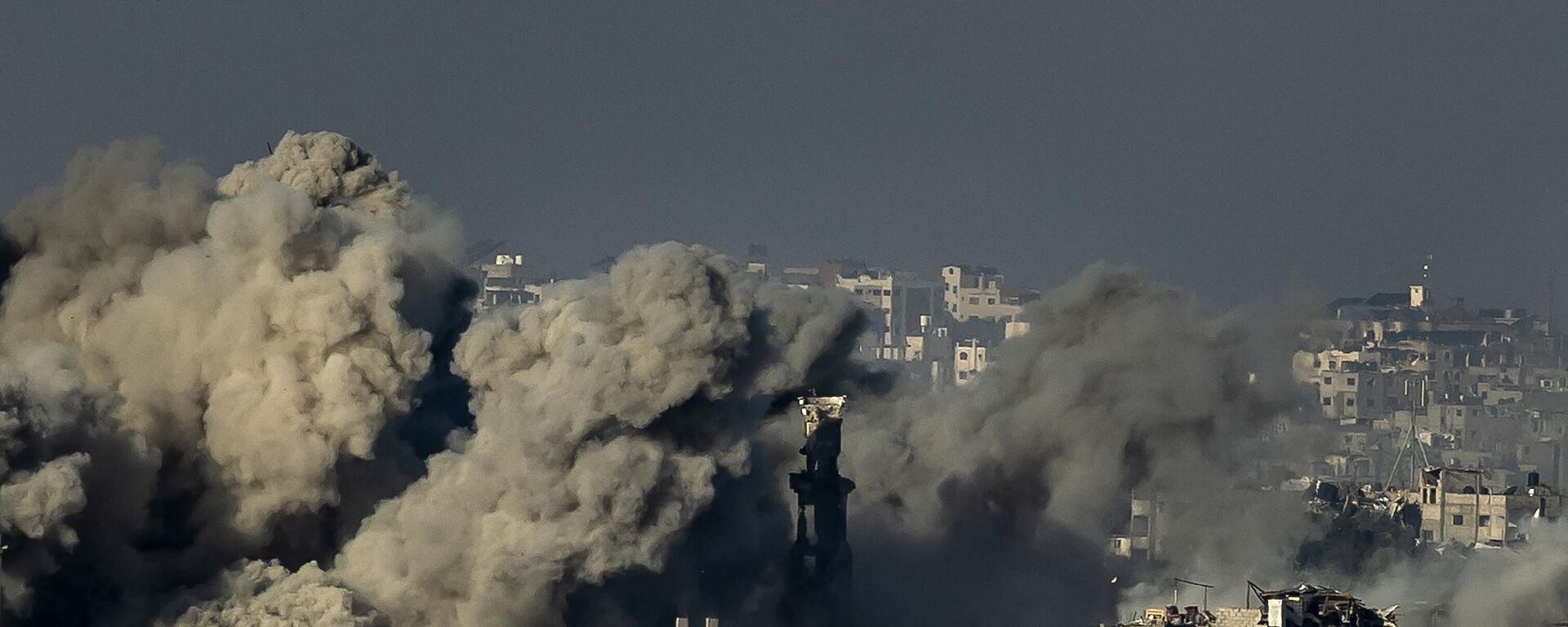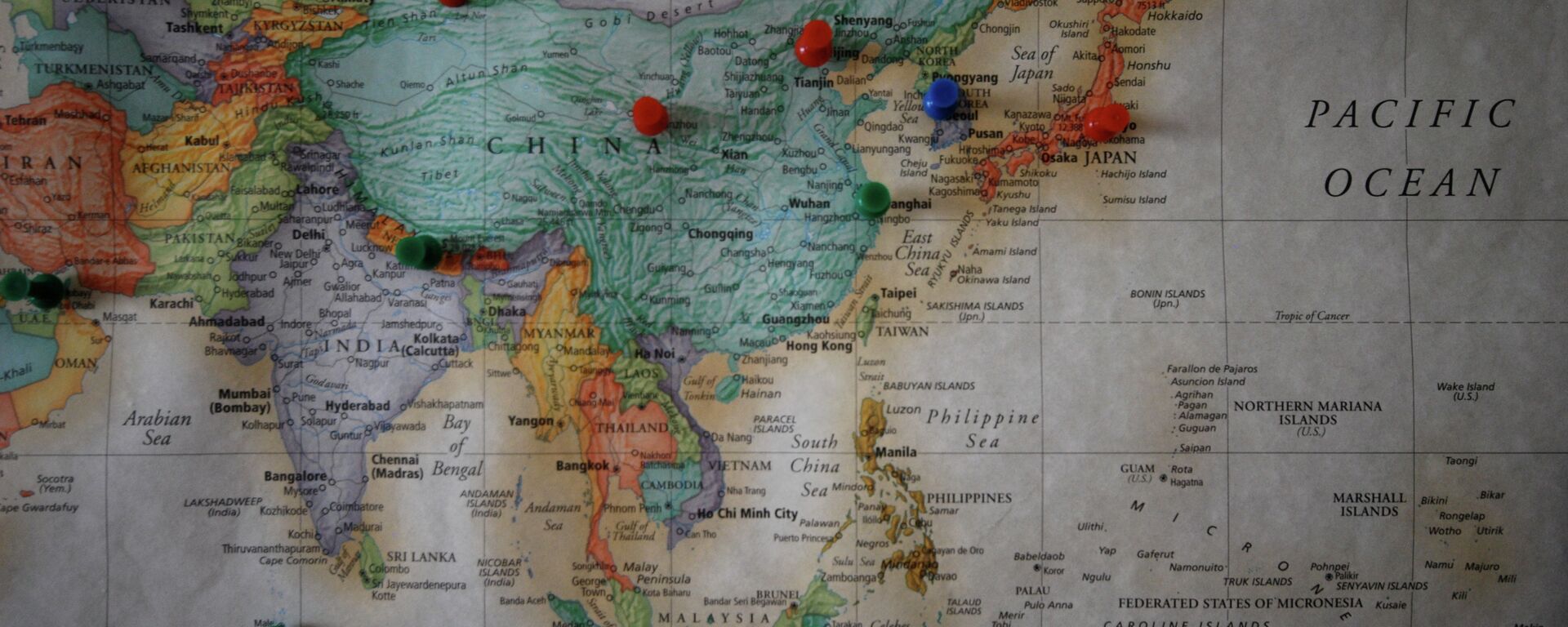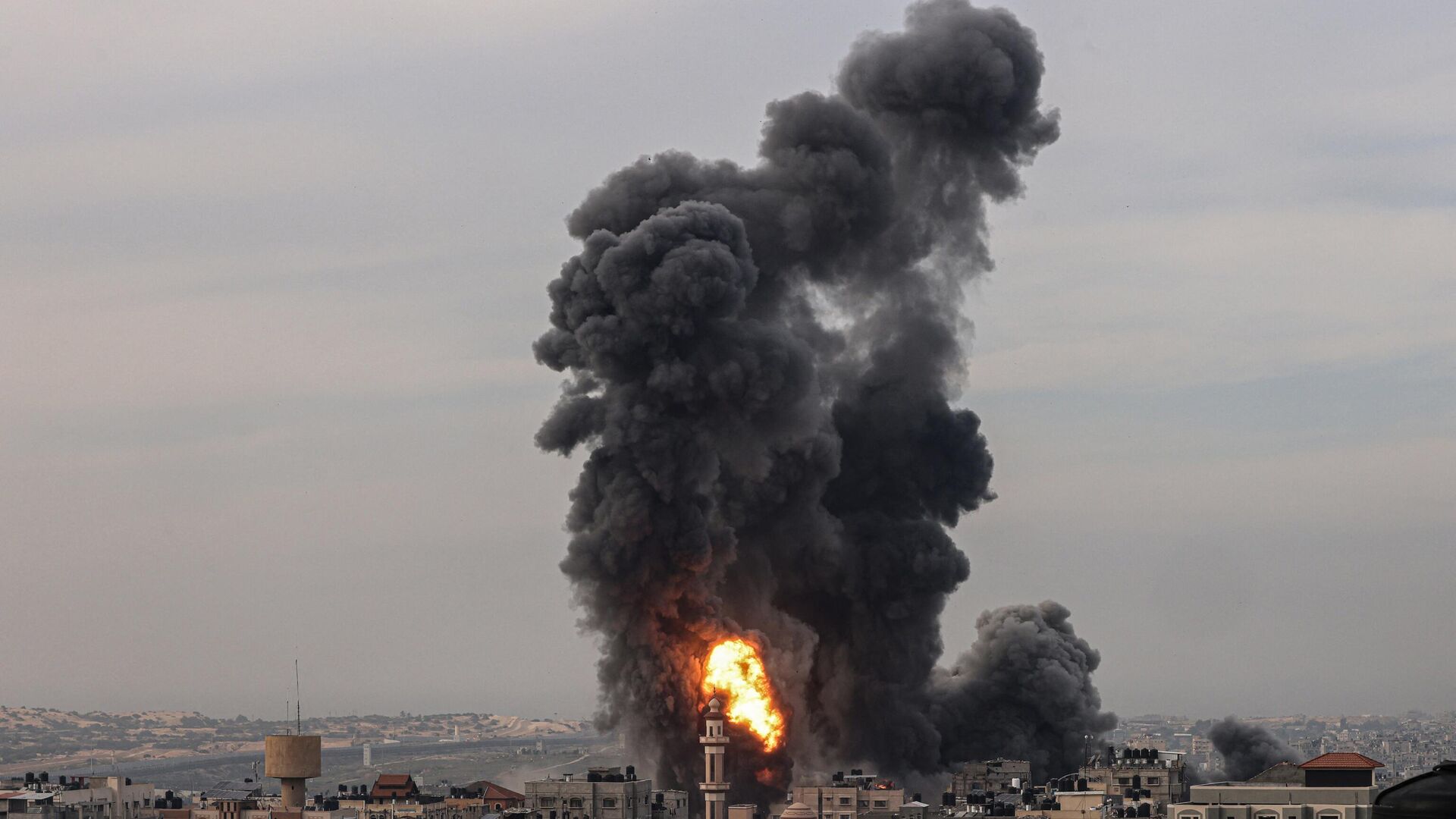https://sputnikglobe.com/20240117/world-on-escalation-spiral-towards-war-as-biden-struggles-to-maintain-credibility-1116213658.html
World on ‘Escalation Spiral’ Towards War as Biden Struggles to Maintain Credibility
World on ‘Escalation Spiral’ Towards War as Biden Struggles to Maintain Credibility
Sputnik International
Events in the Middle East and the US President’s need to consider domestic politics during an election year combine to create a dangerous situation for the world, according to one analyst.
2024-01-17T04:21+0000
2024-01-17T04:21+0000
2024-01-25T18:17+0000
palestine-israel conflict
palestine
israel
israel-gaza conflict
analysis
us
us-china relations
china
russia
iran
https://cdn1.img.sputnikglobe.com/img/07e8/01/0e/1116150690_0:0:3071:1728_1920x0_80_0_0_9e66cb54db9e8d83658638389faeedb7.jpg
The likelihood of global military confrontation is increasing according to analyst Yezid Sayigh, a senior fellow at the Malcolm H. Kerr Carnegie Middle East Center.Sayigh made the assessment during an interview with Chinese media that touched on Israel, the crisis in the Red Sea, and the United States’ so-called “pivot to Asia” policy. Commenting on tensions between Israel and its neighbors in the Middle East, Sayigh offered sobering insight on the potential for events to escalate beyond world leaders’ control.“I think the risk of a wider war is obviously increasing,” said Sayigh. “However, at the same time, I think that the key parties will not go beyond a certain point into direct confrontation. At the same time, they have already started what we call an escalation spiral.”Sayigh employed the metaphor of World War I to explain how events could lead towards war even without world leaders consciously seeking to initiate conflict. World War I was famously set into motion by the murder of Austro-Hungarian heir apparent Archduke Franz Ferdinand. But Sayigh argued the key factor in the war’s outbreak was not the killing itself, but rather the greater zeitgeist of global tension created by previous events.Part of what makes the current moment so perilous are the set of incentives created by domestic politics, Sayigh argued. Israeli Prime Minister Benjamin Netanyahu faces corruption charges, as well as an Israeli public likely to hold the longtime leader accountable for Hamas’ October 7 attack. Netanyahu has an interest in the continuation of military conflict to prevent either of those things threatening his political career.But domestic politics also alters the calculations of US President Joe Biden, the analyst argued. Previously Biden showed signs of returning to former President Barack Obama’s policy of detente with Iran, resisting many neoconservatives' call for war on the Middle Eastern country. Now, domestic support for Israel makes it harder for Biden to pursue reconciliation with the country’s fierce enemy.“Foreign policy in the Middle East will become hostage to American domestic politics, which is very dangerous,” he warned.Sayigh argued that the very credibility of the entire Western world order is threatened by Israel’s ongoing military action against the Palestinians. He noted that the West has done little to pressure Israel or discourage its most significant abuses. Rather, it has seemingly turned its back on the entire post-World War II order it created in favor of supporting its ally.Sayigh asserted that the moment comes just as the United States had committed itself to focusing its attention on East Asia, hoping to prevent China’s rise along with a resurgent Russia. On the contrary, the disruption caused by events in the Middle East could actually accelerate the decline of the West’s hegemony.
https://sputnikglobe.com/20231121/ex-cia-analyst-us-responsible-for-gaza-genocide-by-empowering-netanyahu--1115100230.html
https://sputnikglobe.com/20230717/iran-reserves-right-to-deterrent-measures-as-us-sends-f-16s-to-its-backyard-1111947688.html
https://sputnikglobe.com/20231226/2023-in-review-how-us-pushed-deeper-into-asia-while-focus-was-on-ukraine--israel-1115825784.html
palestine
israel
china
russia
iran
Sputnik International
feedback@sputniknews.com
+74956456601
MIA „Rossiya Segodnya“
2024
John Miles
https://cdn1.img.sputnikglobe.com/img/07e8/01/19/1116388787_0:0:1316:1316_100x100_80_0_0_77e70d36afd983012b1c5d38ddb84156.jpg
John Miles
https://cdn1.img.sputnikglobe.com/img/07e8/01/19/1116388787_0:0:1316:1316_100x100_80_0_0_77e70d36afd983012b1c5d38ddb84156.jpg
News
en_EN
Sputnik International
feedback@sputniknews.com
+74956456601
MIA „Rossiya Segodnya“
Sputnik International
feedback@sputniknews.com
+74956456601
MIA „Rossiya Segodnya“
John Miles
https://cdn1.img.sputnikglobe.com/img/07e8/01/19/1116388787_0:0:1316:1316_100x100_80_0_0_77e70d36afd983012b1c5d38ddb84156.jpg
west’s hegemony, west hegemony, us hegemony, american dominance, american hegemony, humanitarian disaster, humanitarian catastrophe, humanitarian ceasefire, israel-hamas conflict, gaza strip crisis, shelling of gaza, gaza devastation, israel-palestine conflict, palestine-israel conflict, israeli-palestinian conflict, palestinian-israeli, zionist regime, zionists, hamas attack, israeli strikes, israeli forces, hostages, israeli military, hamas fighters, hamas soldiers, hamas military, killings of civilians, civilian infrastructure, civilians dead, civilians die, israel kills civilians, civilian casualties, civilian deaths
west’s hegemony, west hegemony, us hegemony, american dominance, american hegemony, humanitarian disaster, humanitarian catastrophe, humanitarian ceasefire, israel-hamas conflict, gaza strip crisis, shelling of gaza, gaza devastation, israel-palestine conflict, palestine-israel conflict, israeli-palestinian conflict, palestinian-israeli, zionist regime, zionists, hamas attack, israeli strikes, israeli forces, hostages, israeli military, hamas fighters, hamas soldiers, hamas military, killings of civilians, civilian infrastructure, civilians dead, civilians die, israel kills civilians, civilian casualties, civilian deaths
World on ‘Escalation Spiral’ Towards War as Biden Struggles to Maintain Credibility
04:21 GMT 17.01.2024 (Updated: 18:17 GMT 25.01.2024) Events in the Middle East and the US President’s need to consider domestic politics during an election year combine to create a dangerous situation for the world, according to one analyst.
The likelihood of global military confrontation is increasing according to analyst Yezid Sayigh, a senior fellow at the Malcolm H. Kerr Carnegie Middle East Center.
Sayigh made the assessment during an
interview with Chinese media that touched on Israel, the crisis in the Red Sea, and the United States’ so-called “pivot to Asia” policy. Commenting on tensions between Israel and its neighbors in the Middle East, Sayigh offered sobering insight on the potential for events to escalate beyond world leaders’ control.
“I think the risk of a wider war is obviously increasing,” said Sayigh. “However, at the same time, I think that the key parties will not go beyond a certain point into direct confrontation. At the same time, they have already started what we call
an escalation spiral.”
“The US is in a very risky situation, and it increasingly looks as though it is entering the war on the side of Israel as well,” the analyst noted. “[Biden] has already, in a way, signaled military deterrence that encouraged Iran to use military deterrence. Biden, in a way, started this escalation spiral from the beginning with his immediate deployment of military assets to the Mediterranean.”

21 November 2023, 19:19 GMT
Sayigh employed the metaphor of World War I to explain how events could lead towards war even without world leaders consciously seeking to initiate conflict. World War I was famously set into motion by the murder of Austro-Hungarian heir apparent Archduke Franz Ferdinand. But Sayigh argued the key factor in the war’s outbreak was not the killing itself, but rather the greater zeitgeist of global tension created by previous events.
“By 1914, the world was ready for war,” said the historian. “Global tensions had reached a point where it was the assassination that was the trigger, but it might have been something else. It could have been sinking a boat at sea. It could have been anything.”
Part of what makes the current moment so perilous are the set of incentives created by domestic politics, Sayigh argued. Israeli Prime Minister Benjamin Netanyahu faces corruption charges, as well as an Israeli public likely to hold the longtime leader accountable for
Hamas’ October 7 attack. Netanyahu has an interest in the continuation of military conflict to prevent either of those things threatening his political career.
But domestic politics also alters the calculations of US President Joe Biden, the analyst argued. Previously Biden showed signs of returning to former President Barack Obama’s policy of
detente with Iran, resisting many neoconservatives' call for war on the Middle Eastern country. Now, domestic support for Israel makes it harder for Biden to pursue reconciliation with the country’s fierce enemy.
“It [the Biden administration] no longer calculates foreign policy purely on the basis of strategic and global stability, as it was previously doing by improving relations with Iran or at least defusing tensions with Iran,” Sayigh explained. “That was when it was thinking globally. However, now the administration has to consider domestic politics, and the calculation there is different.”
“Foreign policy in the Middle East will become hostage to American domestic politics, which is very dangerous,” he warned.
Sayigh argued that the very credibility of the entire Western world order is threatened by Israel’s ongoing military action against the Palestinians. He noted that the West has done little to pressure Israel or discourage its most significant abuses. Rather, it has seemingly turned its back on the entire post-World War II order it created in favor of supporting its ally.
“The Western response, which disregarded international humanitarian law and the rules of war, also signifies a moment of change in world history,” he shockingly claimed. “The liberal order that the West claims to protect and uphold since 1945 has been abandoned by the West itself.”
Sayigh asserted that the moment comes just as the United States had committed itself to focusing its attention on East Asia, hoping to prevent China’s rise along with a resurgent Russia. On the contrary, the disruption caused by events in the Middle East could actually accelerate the decline of
the West’s hegemony.
“They [Hamas] started a process of the falling apart and the collapse of a world order that was already decaying and degrading,” Sayigh argued. “But it was the moment when it became visible. The change in the international order has been happening for 20 or more years.”

26 December 2023, 22:36 GMT






